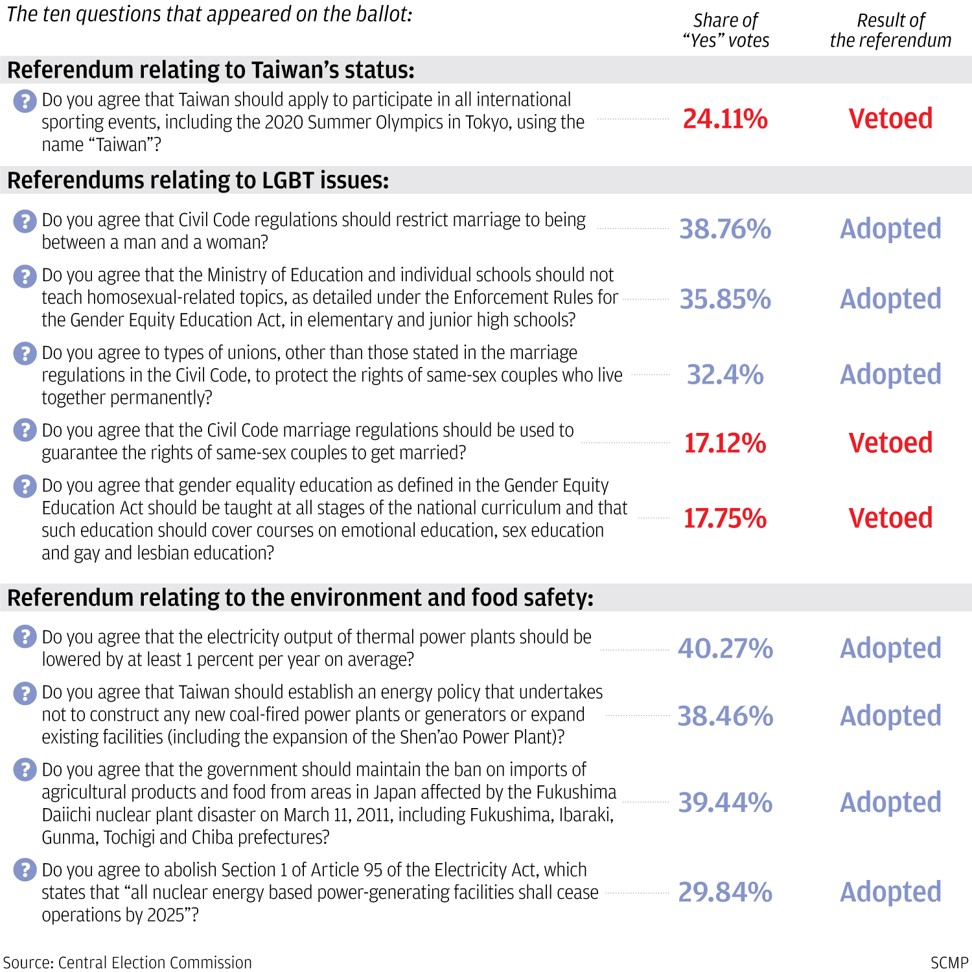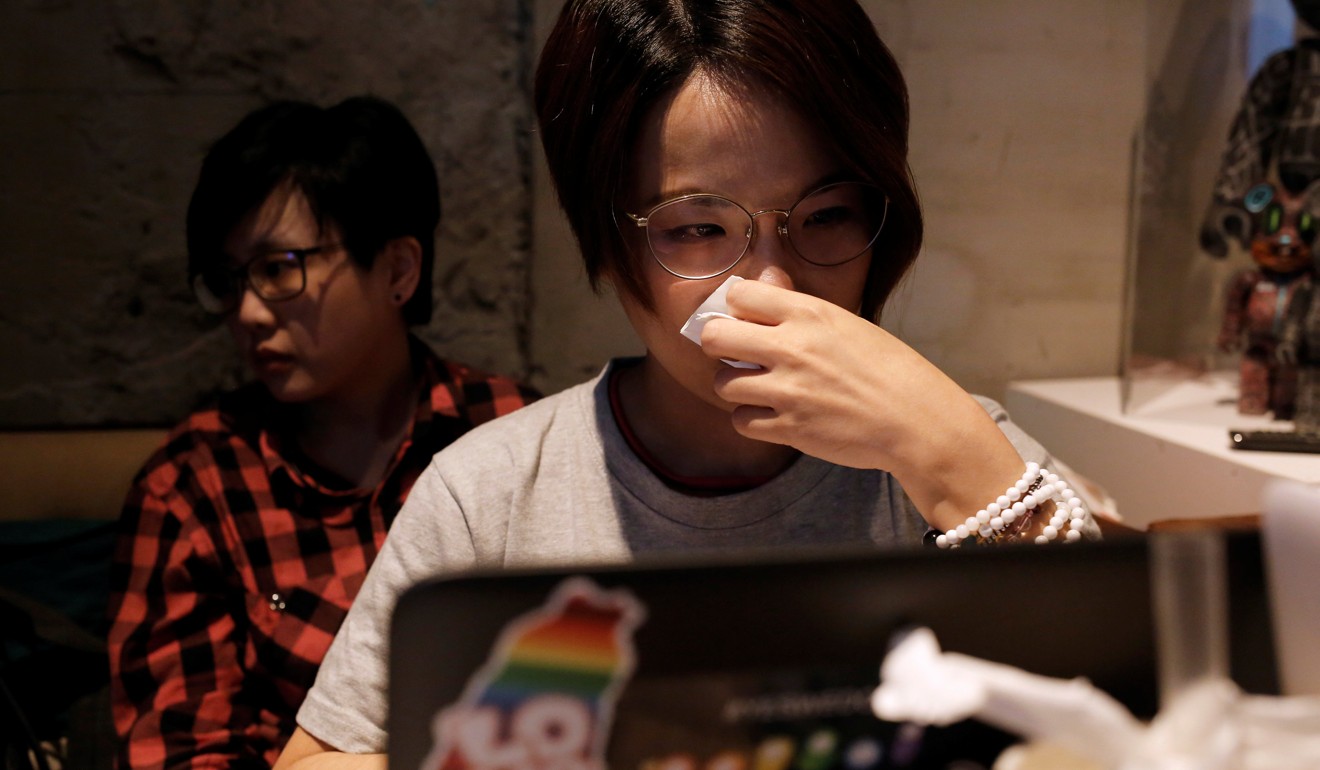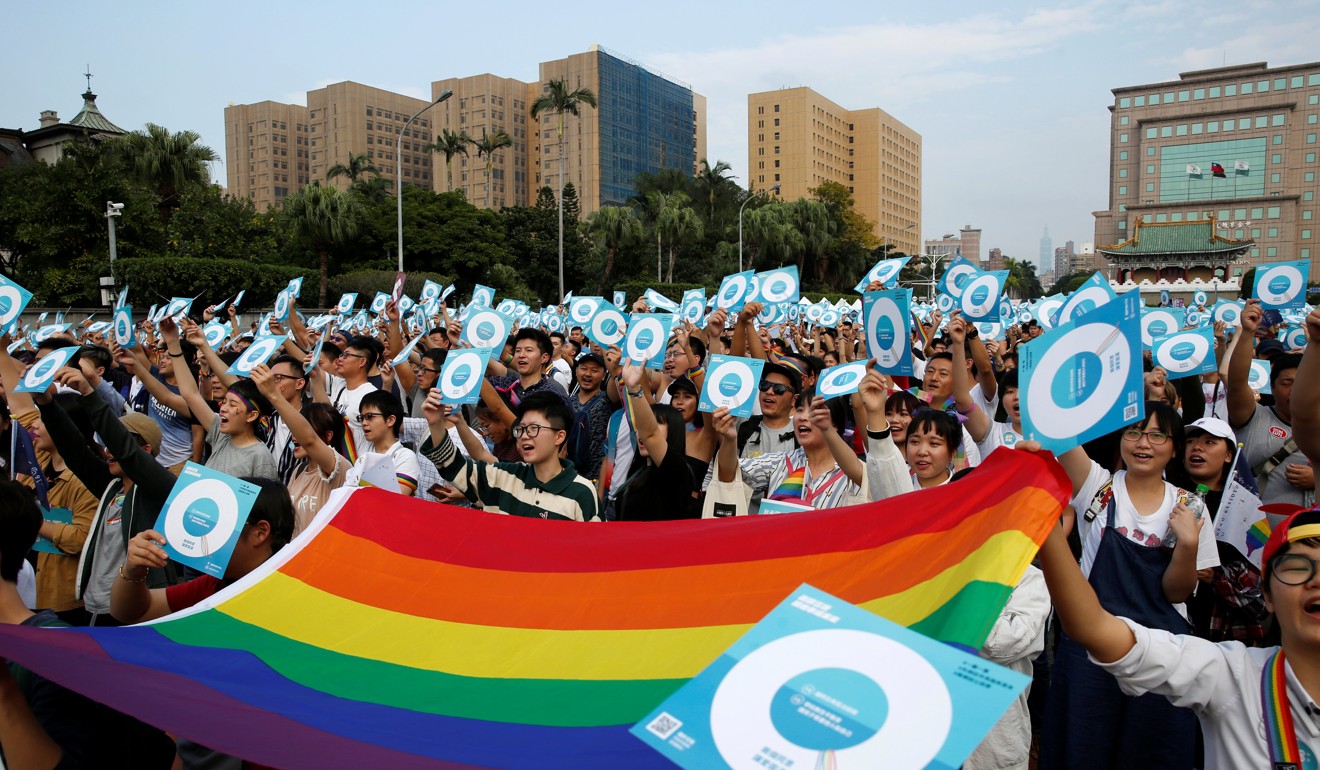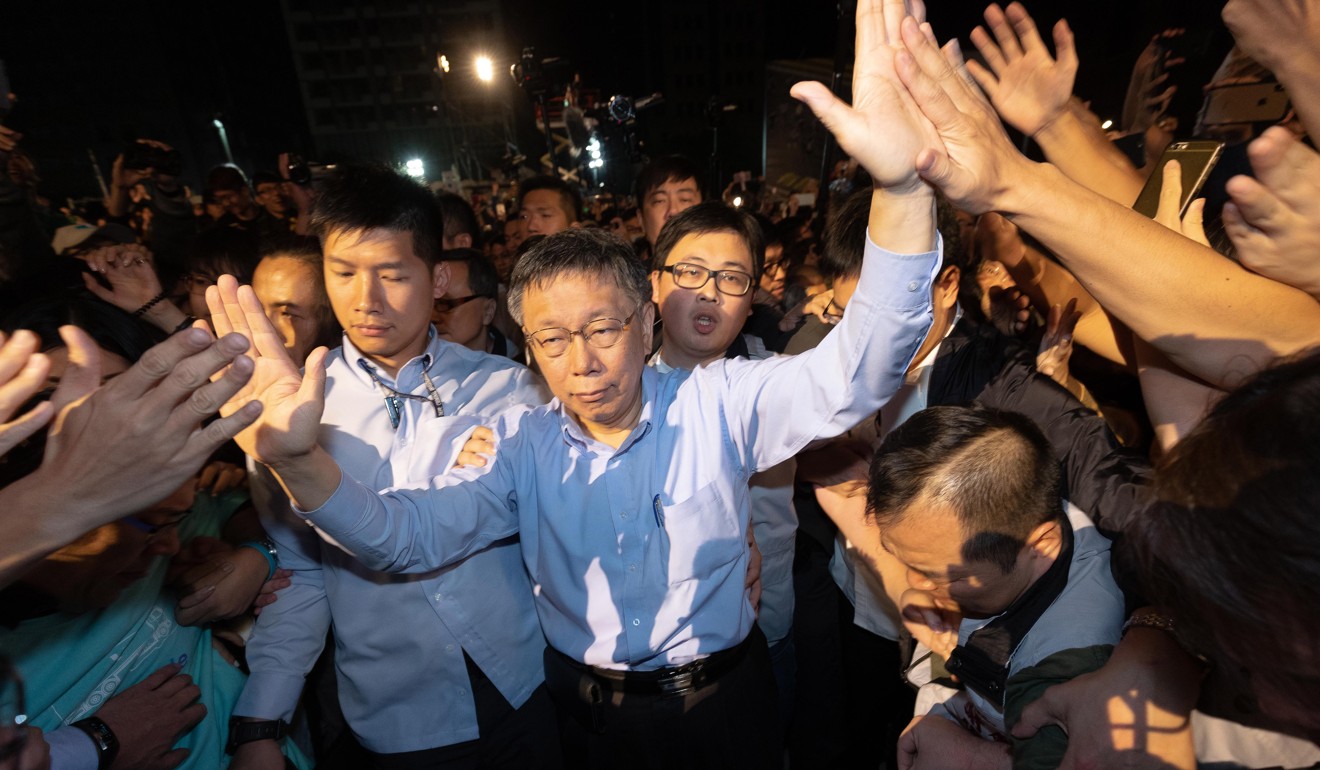
Taiwan’s image as Asia’s LGBT rights beacon takes a hit as same-sex marriage referendum fails
- Voters reject plans to rewrite civil code to allow same-sex marriages and include gay relationships in equality classes
- Campaigners say result is not the end of the line and say they will fight on to try to achieve a consensus
Gay rights campaigners in Taiwan have suffered a serious reversal after voters rejected a proposal to enshrine same-sex marriage in the island’s civil code.
The result was lamented by human rights groups at home and abroad which they said had dampened the progressive image of the self-ruled island as the first place in Asia to approve such unions.
But campaigners said it was not the end of the line and they would continue to press their case until a consensus on marriage equality was reached.
On Saturday voters went to the polls in local elections, which ended in a serious reverse for the ruling Democratic Progressive Party and left the mayoral result in the capital Taipei on a knife-edge.
At the same time, the electorate also had to decide on 10 referendum proposals, including five highly divisive ones on LGBT rights.
The island had been seen as a beacon for gay rights in Asia after the High Court ruled last year that a ban on same-sex unions was unconstitutional and that gay couples would be allowed to officially register their marriages from May next year.
But as well as galvanising supporters, the issue also prompted a backlash from conservative family values campaigners and thousands of activists from both sides took to the streets ahead of Saturday’s vote.
The opponents of same-sex marriage emerged victorious, with all three measures they proposed – to define marriage as solely between a man and a woman, to prohibit primary and junior high school pupils from learning about LGBT issues, and to introduce limited protections for same-sex couples that fell short of marriage equality – being approved by the voters.

“The public have used their ballots to tell the governing authorities what is the mainstream opinion and the result represents a victory for all people who cherish family values and how such values should be taught in schools to the young generation,” said Tseng Hsien-yin, leader of the Coalition for the Happiness of our Next Generation.
He said his organisation and other family values groups would “see that the government revise or institute relevant laws and implement the relevant education guidelines for the school curriculums in line with the results”.
“We will ... send our drafted bill to the parliament as soon as possible for review and passage because we respect same-sex partnerships and believe there should be a special law for them,” he continued.
Taiwanese president resigns as party chairwoman after huge polls defeat
The pro-family camp won between 5.2 and 6.1 million votes in the three referendums. Each measure needed a minimum of 4.9 million votes to pass.
By contrast, two counter measures – to rewrite the civil code to include same-sex unions and to include same-sex relationships in gender equality education classes – failed to secure enough votes, each being backed by around 2.8 million people.
“Our referendums failed not because only a few people support marriage equality, but because we had not been good enough at canvassing support in the way the Coalition for Happiness were,” said Miao Poya, who initiated a campaign for marriage equality referendum.

The pro-family groups’ campaign had been well-funded by a number of Christian organisations.
In a statement, the Taiwan Alliance to Promote Civil Partnership Rights accused the pro-family groups of spreading disinformation to smear marriage equality proposals, by describing them as perverted and linking them to the spread of Aids.
It also accused the groups of illegally swinging votes by handing out publicity material around polling stations. Campaigning once the polls have opened is banned under the island’s electoral law.
“Despite all obstacles, we will continue to fight for same-sex equality rights and use our love and wisdom to shatter all lies until we achieve our goal,” it said.
Amnesty International called on the Taiwanese government to deliver equality and dignity, saying the result was“a bitter blow and a step backwards for human rights in Taiwan”.
Wang Ting-yu, an associate instructor of law at Soochow University and advocate of marriage equality, said although the government had to revise legislation in line with the referendum result, these laws could not supersede the constitution.
This means that same-sex partnerships will still be able to be registered as planned next May, although the couples may not enjoy the same legal protections that changes to the civil code would have given them.
“If the pro-LBGT group finds the protections for same-sex couples inadequate, they can always hold another referendum two years later to call for the revision of the special law,” he said.
He said family values groups had also been calling for the removal of LGBT material in school text books on gender equality.
Taiwan warned by IOC that name change plan is a loser
But Wang said the law stated that children needed to be taught to respect gay people and this was what the books covered, dismissing a claim by campaigners that children were being taught about gay sex.
Asked if he felt Taiwan’s image as a beacon for LGBT rights in Asia would be dampened by the referendum, Wang said gay right movements in each country were different, adding that the opposition same-sex marriage faced only reflected the nature of Taiwanese society.
“After all, it takes time to get a majority consensus or approval for things that the conservative class finds hard to accept,” he added.

A controversial plan to change the name of the island’s sports teams from Chinese Taipei to Taiwan was also voted down by a margin of around 54-45 per cent.
The International Olympic Committee had warned that the self-ruled island risked being kicked out of future games if the measure, which was certain to anger Beijing, passed.
Four environmental measures, including a ban on new coal-fired power plants, also exceeded the threshold needed to pass.
In other results, the mayoral election in the capital Taipei faced the possibility of a recount after the candidate from the opposition KMT party appealed to the courts.
A marathon vote count ended at 2am with a narrow 3,000-vote margin of victory for the incumbent, the independent Ko Wen-je.
But the KMT’s Ting Shou-ching said the results “were full of irregularities” and claimed that voters had been allowed to cast their ballots after the polls officially closed at 4pm.

Lengthy queues were reported at many polling stations across the island, and Taiwan’s electoral law allows those who were waiting in line at the official closing time to cast their ballots.
But Ting demanded a recount and asked the courts to void the result because of the alleged irregularities.
Beijing seeks to build ties with Taiwan cities
A Taipei court later ordered that all ballot boxes should sealed pending a possible recount.
Court officials said that if any irregularities are found, the mayoral election in Taipei will be considered void and a re-election will be held.
Elsewhere, the island’s political map shifted dramatically leaving the mainland-friendly Kuomintang party in control of 15 cities and counties, including three of the country’s special municipalities.
The DPP lost control of seven local authorities, including its former stronghold of Kaohsiung in what local media and analysts interpreted as a vote of no confidence in President Tsai Ing-wen.
She announced that she would step down as chairwoman of the independence-leaning DPP after the vote, while Premier William Lai also offered his resignation but was asked to stay on.
Other senior party figures, including the president’s secretary general Chen Chu also resigned.
Chen, a former mayor of Kaohsiung, had run the party’s losing campaign in the city.
Hung Yao-fu, the DPP’s secretary general, also quit, saying: “I must apologise to our supporters for not doing well enough and for using a wrong campaign strategy.”
Observers said Tsai’s resignation as the party chairwoman would hamper her chances of re-election in 2020 as she would be seen by many as a lame duck.
“The DPP resorted to playing the anti-mainland China and Taiwan independence card in the last month of the campaign in a bid to urge supporters to return to its fold,” said Wang Kung-yao, a political-science professor at the Chinese Culture University in Taipei.
He said such tactics had worked in the past because voters were afraid that Beijing would swallow the island up, but now it had been a “big failure as voters did not buy it”.

